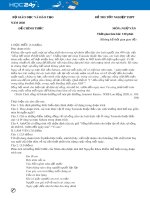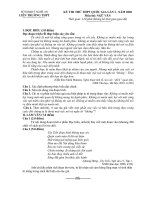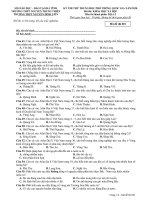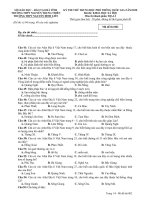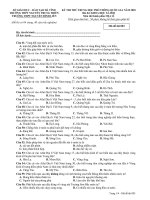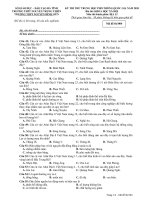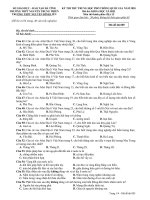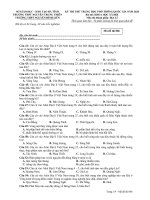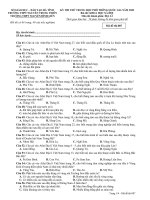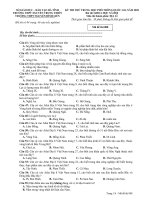Tải Đề ôn thi THPT Quốc Gia môn tiếng Anh năm 2020 số 28 - Đề thi tiếng Anh THPT Quốc Gia 2020 có đáp án
Bạn đang xem bản rút gọn của tài liệu. Xem và tải ngay bản đầy đủ của tài liệu tại đây (122.91 KB, 9 trang )
<span class='text_page_counter'>(1)</span><div class='page_container' data-page=1>
<b>ĐỀ THI THỬ THPTQG MÔN TIẾNG ANH</b>
<b>NĂM 2020 CÓ ĐÁP ÁN</b>
<b>Mark the letter A, B, C or D to indicate the word whose underlined part differs from</b>
<b>the other three in pronunciation in each of the following questions.</b>
<b>Question 1: A. bachelor</b> <b>B. chapter</b> <b>C. chemistry</b> <b>D.teacher</b>
<b>Question 2: A. bushes</b> <b>B. wishes</b> <b>C. researches</b> <b>D.headaches</b>
<i><b>Mark the letter A, B, C, or D to indicate the word that differs from the other three in the</b></i>
<i><b>position of primary stress in each of the following questions.</b></i>
<b>Question 3: A. upset</b> <b>B. preserve</b> <b>C. rhino</b> <b>D. expand </b>
<b>Question 4: A. benefit</b> <b>B. pesticide</b> <b>C. cinema</b> <b>D. aquatic</b>
<i><b>Mark the letter A, B, C, or D to indicate the correct answer to each of the following</b></i>
<i><b>questions. </b></i>
<b>Question 5: Hoang </b> his email four times a week in order not to miss anything
important.
<b>A.</b>checks <b>B. will check</b> <b>C. is checking</b> <b>D. check</b>
<b>Question 6: We're best friends as we have a </b> interest in music.
<b>A. passion</b> <b>B. passionately</b> <b>C. passionless</b> <b>D. passionate</b>
<b>Question 7: However, some scientists argue that the historical evidence shows that over time</b>
the Earthheatsand cools naturally.
<b>A.</b>up - away <b>B. away – down</b> <b>C. up - down</b> <b>D. down - up</b>
<b>Question 8: Everyone can help the needy by making a/ an </b> to a charity organisation.
<b>A.</b>volunteer <b>B. donation</b> <b>C. effort</b> <b>D. fund</b>
<b>Question 9: They </b> your money if you haven't kept your receipt.
<b>A. won't refund</b> <b>B. didn’t refund</b> <b>C. no refund</b> <b>D. not refund</b>
<b>Question 10: The second-hand car Patrick bought was almost new </b> it was made in the
19905.
<b>A. or</b> <b>B. because</b> <b>C. although</b> <b>D. however</b>
<b>Question 11: People demand higher wages because prices are </b> all the time.
</div>
<span class='text_page_counter'>(2)</span><div class='page_container' data-page=2>
<b>Question 12: What measures have been </b> to control traffic jam at rush hours?
A. imagined <b>B. taken</b> <b>C. done</b> <b>D. carried </b>
<b>Question 13: He left on </b> 10 o'clock train yesterday to see his father who was
taken to hospital last week when he broke his right leg.
<b>A. the-the</b> <b>B. the-a</b> <b>C. a-a</b> <b>D. the-0</b>
<b>Question 14: Ann was very surprised to find the door unlocked. She remembered </b> it
before she left.
<b>A. to lock</b> <b>B. having locked</b> <b>C. to have locked</b> <b>D. she locks</b>
<b>Question 15: I had a </b> chat with my manager and gave him an update on the project.
<b>A. brief</b> <b>B. short</b> <b>C. quick</b> <b>D. lull</b>
<b>Question 16: It’s normal for small businesses to operate at a </b> for the first couple of years
before they start to break even.
<b>A. loss</b> <b>B. failure</b> <b>C. luck</b> <b>D. loose</b>
<b>Question 17: Mary expected </b> to her dreamy university, but she wasn't.
A. to admit <b>B. admitting</b> <b>C. to be admitted</b> <b>D. </b> being
admitted
<b>Question 18: These thought-provoking poems </b> questions about what it means to love
unconditionally.
<b>A. draw</b> <b>B. raise</b> <b>C. make</b> <b>D. give</b>
<b>Mark the letter A, B, C, or D to indicate the word(s) CLOSEST in meaning to the</b>
<b>underlined word (5) in each of the following questions.</b>
<b>Question 19: Both CARE and Oxfam organisations have programmes to help people in</b>
<b>underdeveloped countries better their lives.</b>
<b>A. make</b> <b>B. risk</b> <b>C. improve</b> <b>D. start</b>
<b>Question 20: Some tourist areas have suffered from some environmental damage.</b>
<b>A. covered</b> <b>B. finished</b> <b>C. taken</b> <b>D. undergone</b>
</div>
<span class='text_page_counter'>(3)</span><div class='page_container' data-page=3>
<b>Question 21: From my point of View, parental divorce can cause lasting negative</b>
consequences for children.
<b>A. beginning of a marriage</b> <b>B. the situation of not marrying</b>
<b>C. single person</b> <b>D. ending of a marriage</b>
<b>Question 22: Cutting down on energy use is the best way to help reduce global warming.</b>
A. Shrinking <b>B. Declining</b> <b>C. Decreasing</b> <b>D. Increasing </b>
<i><b>Mark the letter A, B, C, or D to indicate the sentence that best completes each of</b></i>
<i><b>the following exchanges.</b></i>
<b>Question 23: Mai: "How fashionable a pair of trainers</b>
you have!” Nam: " ."
<b>A.</b>Do you want to know where I bought them?
<b>B.</b>Thanks for your compliment.
<b>C.</b>I know it's fashionable.
<b>D.</b>Yes, of course.
<b>Question 24: A: "What a beautiful wedding dress you are wearing</b>
today, Daisy!" B: “ .”
<b>A. I'm sorry to hear that.</b> <b>B. Thanks, it's nice of you to say so.</b>
<b>C. Don't mention it.</b> <b>D. Thanks for your gift!</b>
<b>Read the following passage and mark the letter A, B, C, or D to indicate the correct</b>
<b>word or phrase that best fits each the numbered blanks.</b>
In some sense, the way we manage our social connections on Facebook is no different
from how we build relationships offline. The need for (25) is one of the most basic
motivations underlying social behavior. We use Facebook to maintain a positive social
identity and satisfy needs for acceptance and social affiliation.
One study, conducted by researchers in New Zealand, looked into how people weaved
Facebook into their daily lives. They were primarily interested in the social dimensions
of Facebook, (26)
they divided into two categories: direct and indirect actions.
</div>
<span class='text_page_counter'>(4)</span><div class='page_container' data-page=4>
person's status updates. Most Facebook users initiate a combination of direct and indirect
actions when they use the website. Some do this quite (27) , with nearly a third of
users (31%) posting daily status updates.
The social benefits of using Facebook to communicate with friends and build
relationships are mixed. Researchers at Carnegie Mellon University and Facebook
analyzed the server logs of more than a thousand Facebook users over a period of two
months, and conducted a survey to ask users about how
close they feel to their friends, and the frequency with which they make new social
connections. They found that Facebook users who engaged (28) greater
direct actions (messaging, commenting) reported greater bridging (making new friends),
social bonding, and self-esteem. (29) , users who had a record of more indirect
actions and passive consumption (refreshing the news feed, reading friends' status updates
and Viewing their profiles) reported more frequent feelings of loneliness and lower
self-esteem.
<b>Question 25: A. association B. connect</b> <b>C. connectedness</b> <b>D. link </b>
<b>Question 26: A. which</b> <b>B. where</b> <b>C. that</b> <b>D. who </b>
<b>Question 27: A. frequent</b> <b>B. frequency</b> <b>C. frequently</b> <b>D. frequented </b>
<b>Question 28: A. in</b> <b>B. on</b> <b>C. off</b> <b>D. out </b>
<b>Question 29: A. Therefore</b> <b>B. In contrast</b> <b>C. Otherwise</b> <b>D. In addition</b>
<b>Read the following passage and mark the letter A, B, C, or D to indicate the answer</b>
<b>to each of the question.</b>
During the past half-century, our species has embarked on a remarkable social experiment. For
the first time in human history, great numbers of people - at all ages, in all places, of every
political persuasion - have begun settling down as singletons. Until the second half of the last
century, most of us married young and parted only at death. If death came early, we remarried
quickly; if late, we moved in with family, or they with us. Now we marry later. We divorce,
and stay single for years or decades.
</div>
<span class='text_page_counter'>(5)</span><div class='page_container' data-page=5>
middle-aged adults between the ages of 3S and 64. The elderly account for about 11 million of
the total. Young adults between 18 and 34 number increased more than 5 million, compared
<b>with 500,000 in 1950, making them the fastest-growing segment of the solo-dwelling</b>
population.
Despite fears that living alone may be environmentally unsustainable, solos tend to live in
apartments rather than in big houses, and in relatively green cities rather than in
car-dependent suburbs. There's good reason to believe that people who live alone in cities
<b>consume less energy than if they coupled up and decamped to pursue a single-family home.</b>
<b>Question 30: The best title for this passage could be </b> .
<b>A. the rise in solo living</b> <b>B. figures about solo dwellers in the US</b>
<b>C. the increase in divorce</b> <b>D. solos have tendency to live in small</b>
houses
<b>Question 31: Which statement is probably TRUE according to the information in paragraph 1?</b>
<b>A.</b>From the beginning of the last century, people married at young age and only
death separated them.
<b>B.</b>Until the second half of the last century, a large number of people married young
and parted only at death.
<b>C.</b>From the beginning of last century, people have begun settling down as singletons.
<b>D.</b>Until the second half of the last century, people divorce, and stay single for years or
decades
<b>Question 32: The word “them” in paragraph 2 refers to </b> ?
<b>A. singletons</b> <b>B. the elderly</b> <b>C. predecessors</b> <b>D. young adults</b>
<b>Question 33: In the 2rd paragraph, the writer suggests that </b> .
<b>A.</b>The elderly take up for a large number of the total solo dwellers
<b>B.</b>In the US, more male choose to live alone than female
<b>C.</b>Solos dwellers have helped to renew cities as they seem to spend money,
socialize and take part in public life
<b>D.</b>There are fewer middle-aged solos than the elderly who live alone
<b>Question 34: The word "decamped" in paragraph 3 means </b> .
</div>
<span class='text_page_counter'>(6)</span><div class='page_container' data-page=6>
<i><b>Read the following passage and mark the letter A, B, C, or D to indicate the answer to</b></i>
<i><b>each of the question.</b></i>
Educating children at home as an alternative to formal education is an option chosen by
families in many parts of the world. The homeschooling movement is popular in the
United States, where close to one million Children are educated at home. In Canada, 1
percent of school-age children are homeschooled, and the idea also enjoys growing
popularity in Australia, where 20,000 families homeschool their children. The movement
is not limited to these countries. Homeschooling families can be found all over the world,
from Japan to Taiwan to Argentina to South Africa.
Homeschooling is not a novel idea. In fact, the idea of sending children to spend most of
their day away from home at a formal school is a relatively new custom. In the United
States, for example, it was not until the latter part of the nineteenth century that state
<b>governments began making school attendance compulsory. Before that, the concept of a</b>
<b>formal education was not so widespread. Children learned the skills they would need for</b>
adult life at home from tutors or their parents, through formal instruction or by working
side by side with the adults of the family.
In the modern developed world, where the vast majority of children attend school,
families choose homeschooling for a variety of reasons. For people who live in remote
areas, such as the Australian outback or the Alaskan Wilderness, homeschooling may be
their only option. Children who have exceptional talents in the arts or other areas may be
homeschooled so that they have more time to devote to their special interests. Much of
the homeschooling movement is made up of families who, for various reasons, are
dissatisfied with the schools available to them. They may have a differing educational
philosophy, they may be concerned about the safety of the school environment, or they
<b>may feel that the local schools cannot adequately address their children's educational</b>
needs. Although most families continue to choose a traditional classroom education for
their children, homeschooling as an alternative educational option is becoming more
popular.
<b>Question 35: Which of the following could be the main idea of the passage?</b>
<b>A.</b>A new form of school: Homeschooling
<b>B.</b>Homeschool option: a common form of education all over the world.
</div>
<span class='text_page_counter'>(7)</span><div class='page_container' data-page=7>
<b>D.</b>The origin of Homeschooling.
<b>Question 36: What does the word “that” in paragraph 2 refer to?</b>
<b>A. the second half of the 19th century</b> <b>B. the beginning of the 19th century</b>
<b>C. the former part of the 19th century</b> <b>D. the end of the 19th century</b>
<b>Question 37: The word "widespread" in paragraph 2 mostly means </b> .
<b>A. uncommon</b> <b>B. customary</b> <b>C. exceptional</b> <b>D. prevalent</b>
<b>Question 38: According to the passage, the following are true about the Homeschooling,</b>
<b>EXCEPT</b>
.
<b>A.</b>Many families in both developed and developing countries choose to educate their
children at home.
<b>B.</b>Parents or tutors were the ones who taught the children necessary skills in society.
<b>C.</b>People got familiar with school attendance before choosing to learn at home.
<b>D.</b>Before modern times, most students did not attend the school.
<b>Question 39: As mentioned in the last paragraph, children in rural areas </b> .
<b>A.</b>have no choice but stay at home to learn.
<b>B.</b>prefer to improve their extraordinary interests.
<b>C.</b>are not contented with the philosophy of the schools available.
<b>D.</b>believe that their needs to study is more than what a normal school can provide.
<b>Question 40: It can be inferred from the last passage that </b> .
<b>A.</b>parents’ satisfaction plays an important role in the number of students attending
class.
<b>B.</b>teachers’ qualifications may be one of the reasons why students come to school.
<b>C.</b>not many children in modern society are allowed to be educated at home.
<b>D.</b>some schools are unable to provide a safe environment for their students.
<b>Question 41: The word “adequately” in paragraph 3 is closest in meaning to </b> .
<b>A. correctly</b> <b>B. applicably</b> <b>C. sufficiently</b> <b>D. inappropriately</b>
<b>Question 42: What does the author mean in the last sentence?</b>
<b>A.</b>Families are gradually aware of the importance of school attendance.
</div>
<span class='text_page_counter'>(8)</span><div class='page_container' data-page=8>
<b>C.</b>Homeschooling will replace the traditional classroom one day in the future.
<b>D.</b>Many people prefer formal schools because of its fame.
<b>Mark the letter A, B, C or D to indicate the underlined part that needs correction</b>
<b>in each of the following questions.</b>
<b>Question 43: I wish to publicly record my gratitude to those whose support and assistance</b>
were made this possible.
A. wish <b>B. publicly record</b> <b>C. to those</b> <b>D. </b> were
made
<b>Question 44: Viet Nam was the first lndochinese country joining ASEAN, and its move</b>
helped end confrontation between the lndochinese party and ASEAN.
<b>A. was</b> <b>B. joining</b> <b>C. confrontation</b> <b>D. its move</b>
<b>Question 45: Anyone who gambles on the stock exchange has to be prepared to loose money.</b>
A. Anyone who <b>B. on</b> <b>C. has to be D. to loose money </b>
<i><b>Mark the letter A, B, C, or D to indicate the sentence that is closest in meaning to each of</b></i>
<i><b>the following questions.</b></i>
<b>Question 46: “We saw a strange man in the garden,” they told their son.</b>
<b>A.</b>They told their son that we had seen a strange man in the garden.
<b>B.</b>They told their son that they had seen a strange man in the garden.
<b>C.</b>They told their son that we saw a strange man in the garden.
<b>D.</b>They told their son that they saw a strange man in the garden.
<b>Question 47: Nobody in my class is as outgoing as I am.</b>
<b>A.</b>I am as outgoing as nobody in my class.
<b>B.</b>I am the more outgoing than nobody in my class.
<b>C.</b>I am the most outgoing person in my class.
<b>D.</b>I am not as outgoing as people in my class.
<b>Question 48: It is pointless to ask me about it because I know nothing.</b>
<b>A.</b>It's no use asking me about it because I know nothing.
<b>B.</b>It's no use to ask me about it because I know nothing.
<b>C.</b>It's not use asking me about it because I know nothing.
</div>
<span class='text_page_counter'>(9)</span><div class='page_container' data-page=9>
<b>Mark the letter A, B, C, or D to indicate the sentence that best combines each pair of</b>
<b>sentences in the following questions.</b>
<b>Question 49: It’s cold outside and my leg hurts. I haven’t been out for weeks.</b>
<b>A.</b>I haven't been out for weeks, which makes the weather cold and my leg bad.
<b>B.</b>The weather is cold and my leg is bad as a result of my stay indoors for weeks.
<b>C.</b>What with the cold weather and my bad leg, I haven't been out for weeks.
<b>D.</b>What makes the weather cold and my leg bad is my stay indoors for weeks.
<b>Question 50: His Wife phoned him early in the morning. She didn’t want him to forget to</b>
bring along the document.
<b>A.</b>His wife phoned him early in the morning lest he would forget to bring along the
document.
<b>B.</b>His wife phoned him early in the morning so that she wanted him to bring along the
document.
<b>C.</b>His wife phoned him early in the morning when she didn't want him to
bring along the document.
<b>D.</b>His wife phoned him early in the morning though she didn't want him to
forget to bring along the document.
<b>ĐÁP ÁN</b>
1 - C 2 - D 3 - C 4 - D 5 - A 6 - D 7 - C 8 - B 9 - A 10 - C
11 - A 12 - B 13 - D 14 - B 15 - A 16 - A 17 - C 18 - B 19 - C 20 - D
21 - A 22 - D 23 - B 24 - B 25 - C 26 - A 27 - C 28 - A 29 - B 30 - A
31 - B 32 - D 33 - C 34 - C 35 - B 36 - A 37 - C 38 - C 39 - A 40 - A
41 - C 42 - B 43 - D 44 - B 45 - D 46 - B 47 - C 48 - A 49 - C 50 - A
</div>
<!--links-->
